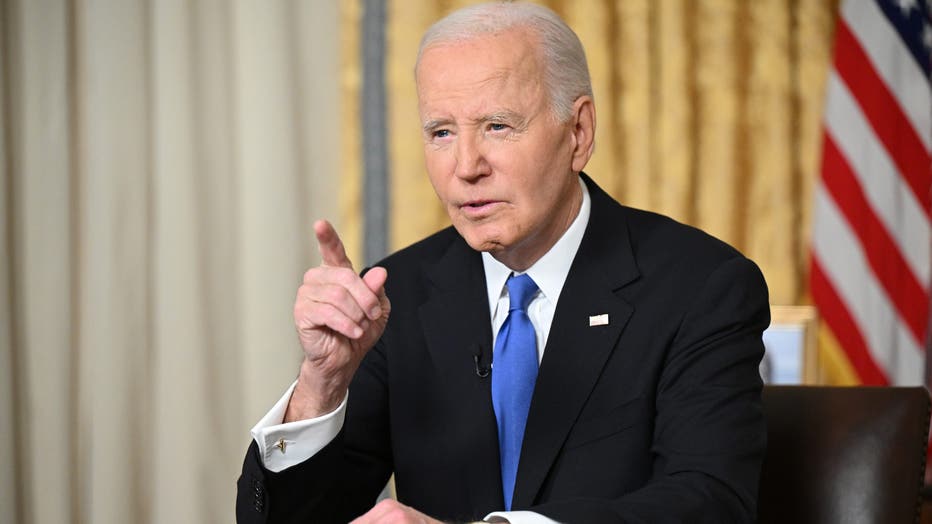Biden says 28th Amendment, the ERA, should be considered law

Biden delivers farewell address from the Oval Office
On Wednesday evening, Joe Biden addressed the nation as president for the last time, live from the Oval Office.
President Joe Biden says the Equal Rights Amendment should be considered a ratified addition to the U.S. Constitution, despite knowing that presidents have no role in the constitutional process.
"In keeping with my oath and duty to Constitution and country, I affirm what I believe and what three-fourths of the states have ratified: the 28th Amendment is the law of the land, guaranteeing all Americans equal rights and protections under the law regardless of their sex," Biden announced Friday.
It was the latest in a collection of pronouncements that Biden has made in the waning days of his presidency, irking some allies who believe he should have acted more swiftly and spoken out sooner.
RELATED: Biden won’t enforce TikTok ban, leaving fate of app up to Trump
What is the Equal Rights Amendment?
By the numbers:
The struggle over the Equal Rights Amendment started in 1923 when leading suffragist Alice Paul first proposed it shortly after the ratification of the 19th Amendment, which granted women the right to vote. The ERA, if formally recognized as the 28th Amendment, would make gender equality explicit under the Constitution.
RELATED: Biden commutes sentences of nearly 2,500 non-violent drug offenders
The Equal Rights Amendment, which would ban discrimination based on gender, was sent to the states for ratification in 1972. It needed to be ratified by 38 states to become law of the land. Virginia became the 38th state to ratify it in 2020, although years past the 1982 deadline set by Congress, leading to a legal standoff over whether it could be considered valid.
The National Archives says the ERA cannot legally be certified without further action by Congress or the courts.
Timeline:
- Dec. 10, 1923: The first draft of the ERA, written by suffragist Alice Paul, is introduced in Congress by Sen. Charles Curtis, a Kansas Republican. Paul's original amendment text stated: "Men and women shall have equal rights throughout the United States and every place subject to its jurisdiction. Congress shall have power to enforce this article by appropriate legislation."
- March 22, 1972: The Senate joins the House in passing an amended version of the ERA with a seven-year deadline for states to ratify it. It states: "Equality of rights under the law shall not be denied or abridged by the United States or by any State on account of sex." Hawaii quickly becomes the first state to ratify.
- Oct. 6, 1978: Congress approves an extension of the deadline for state ratification of the ERA to June 30, 1982.
- June 30, 1982: Congress-imposed deadline for ratification passes with three states short of the 38 needed for the ERA to become law.
- Jan. 8, 2020: The Justice Department finds that it's too late for additional states to ratify the ERA because of the two expired deadlines imposed by Congress.
- Jan. 7, 2020: Virginia becomes the 38th state to ratify the Equal Rights Amendment.
- Feb. 13, 2020: House approves measure removing 1982 deadline for ERA state ratification.
- April 27, 2023: Senate Republicans block a Democratic measure to remove the 1982 deadline for state ratification and move forward with the ERA.
- Jan. 17, 2025: Biden declares the ERA should be considered ratified, but it is only a symbolic statement and it doesn’t resolve the dispute.
Does Biden’s ERA statement mean anything?

US President Joe Biden delivers his farewell address to the nation from the Oval Office of the White House on January 15, 2025 in Washington, DC. (Photo by Mandel Ngan - Pool/Getty Images)
It’s unlikely that Biden’s support will have any impact. The National Archives has to certify the amendment because of the expired deadline for ratification. On Friday, the National Archives reiterated its position by saying "the underlying legal and procedural issues have not changed."
RELATED: Will Biden leave Trump a note? The presidential tradition explained
Biden did not direct the leader of the National Archives to certify the amendment, as some activists have called for.
What they're saying:
"I wish it was done sooner because it’s so important," said Christian F. Nunes, leader of the National Organization for Women. "The fact that it’s getting done now is more important than the fact that it took long, but we can’t continue to delay women’s protections and equal rights in this country."
Claudia Nachega, a leader in the Young Feminist Party, said certifying the Equal Rights Amendment would signal "the beginning of a new American era that gives us a fighting chance of surviving a second Trump presidency."
The other side:
Biden defended his decision not to weigh in until the end of his term by telling reporters that he "needed all the facts."

Presidency 'honor of my life,' Biden says
Political reporter Ben Jacobs joins LiveNOW's Andrew Craft and Andy Mac to discuss main takeaways from President Biden's farewell speech.
Earlier in the day, Biden contradicted himself with a statement saying "it is long past time to recognize the will of the American people."
Dig deeper:
It was the latest in a collection of pronouncements that Biden has made in the waning days of his presidency as he tries to tie up loose ends and embroider his legacy despite leaving after only one term.
RELATED: Biden awards Pope Francis the Presidential Medal of Freedom
With his popularity low and political influence running dry before he’s replaced by Donald Trump on Monday, Biden’s statements have stirred aggravation among some allies who believe he should have acted more swiftly and spoken out earlier.
The Source: This report includes information from the Associated Press.

